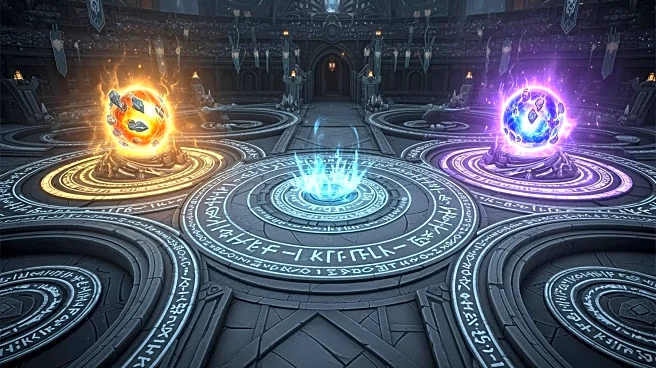What's Happening?
Pokémon Legends: Z-A Ranked Battles is a new competitive feature that allows trainers to engage in real-time battles with their Pokémon. The system includes 26 ranks, from Z to A, which reflect a trainer's
skill level. Participants can earn points and advance through ranks by defeating opponents and performing specific actions during battles. Trainers can prepare their battle teams by selecting Pokémon from their boxes and equipping them with items like Mega Stones. Battles are timed at three minutes, and trainers are ranked based on the number of opposing Pokémon they defeat. The game encourages strategic play by offering points for actions such as dealing the first attack, using Mega Evolution, and defeating Mega-Evolved Pokémon.
Why It's Important?
The introduction of Ranked Battles in Pokémon Legends: Z-A offers a new layer of competitive gameplay that could significantly impact the Pokémon gaming community. It provides an opportunity for players to showcase their strategic skills and climb the ranks, fostering a more engaging and competitive environment. This feature may attract a broader audience, including those interested in esports and competitive gaming, potentially increasing the game's popularity and player base. The ranking system and rewards for specific actions encourage players to develop diverse strategies, enhancing the overall gaming experience.
What's Next?
As players begin to engage with the Ranked Battles, the competitive landscape of Pokémon Legends: Z-A is expected to evolve. Trainers will likely develop new strategies to maximize their points and advance through the ranks. The game may introduce seasonal events or updates to keep the competition fresh and exciting. Additionally, the community's feedback could lead to adjustments in the ranking system or the introduction of new rewards and challenges. The ongoing development of this feature will be crucial in maintaining player interest and engagement.
Beyond the Headlines
The Ranked Battles system in Pokémon Legends: Z-A could have broader implications for the gaming industry, particularly in the realm of competitive gaming. It highlights the growing trend of integrating esports elements into traditional video games, potentially influencing other game developers to adopt similar features. The emphasis on strategic gameplay and ranking systems may also encourage players to invest more time and effort into mastering the game, leading to a more dedicated and skilled player base.









